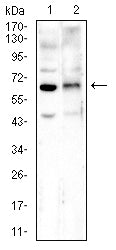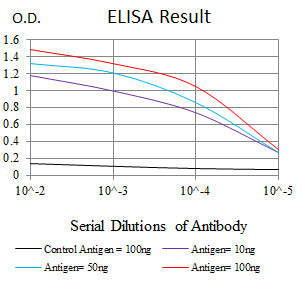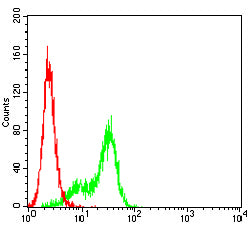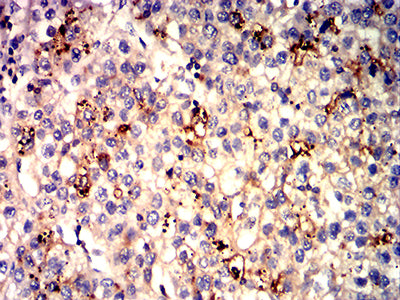



| WB | 1/500 - 1/2000 | Human,Mouse,Rat |
| IF | 咨询技术 | Human,Mouse,Rat |
| IHC | 1/200 - 1/1000 | Human,Mouse,Rat |
| ICC | 技术咨询 | Human,Mouse,Rat |
| FCM | 1/200 - 1/400 | Human,Mouse,Rat |
| Elisa | 1/10000 | Human,Mouse,Rat |
| Aliases | SGB; DGSX; MXR7; SDYS; SGBS; OCI-5; SGBS1; GTR2-2 |
| Entrez GeneID | 2719 |
| clone | 2A2H1 |
| WB Predicted band size | 65.5kDa |
| Host/Isotype | Mouse IgG1 |
| Antibody Type | Primary antibody |
| Storage | Store at 4°C short term. Aliquot and store at -20°C long term. Avoid freeze/thaw cycles. |
| Species Reactivity | Human |
| Immunogen | Purified recombinant fragment of human GPC3 (AA: 55-200) expressed in E. Coli. |
| Formulation | Purified antibody in PBS with 0.05% sodium azide |
+ +
以下是关于GPC3抗体的3篇参考文献及其摘要概括:
1. **文献名称**: *Glypican-3: A Novel Serum and Histochemical Marker for Hepatocellular Carcinoma*
**作者**: Capurro M, et al.
**摘要**: 该研究首次提出GPC3作为肝细胞癌(HCC)的特异性生物标志物,通过免疫组化和血清检测发现GPC3在HCC组织中高表达,而在正常肝组织和良性病变中不表达,表明其作为诊断标志物的潜力。
2. **文献名称**: *Targeting Glypican-3 via CAR-T Cells for the Treatment of Hepatocellular Carcinoma*
**作者**: Zhu W, et al.
**摘要**: 研究构建了靶向GPC3的CAR-T细胞,并在临床前模型中验证其对GPC3阳性肝癌细胞的杀伤效果,结果显示显著抑制肿瘤生长且安全性良好,为肝癌免疫治疗提供了新策略。
3. **文献名称**: *Development of a Humanized Anti-GPC3 Antibody-drug Conjugate for Hepatocellular Carcinoma Therapy*
**作者**: Ismail A, et al.
**摘要**: 该文献报道了一种人源化GPC3抗体与细胞毒性药物的偶联物(ADC),在体外和动物实验中显示对GPC3高表达肿瘤细胞的高效选择性杀伤,提示其作为靶向治疗的潜在应用价值。
4. **文献名称**: *Comparative Analysis of GPC3 Antibody-based Detection Methods in Early-stage Hepatocellular Carcinoma*
**作者**: Hsu HC, et al.
**摘要**: 研究比较了ELISA和免疫组化法检测GPC3的敏感性和特异性,发现两者在早期肝癌诊断中互补使用可提高检出率,强调了GPC3抗体在临床分型中的重要性。
这些文献涵盖了GPC3抗体在诊断、靶向治疗及检测技术优化中的关键研究。
The glypican-3 (GPC3) antibody targets GPC3. an oncofetal protein belonging to the glypican family of heparan sulfate proteoglycans. GPC3 is anchored to the cell membrane via a glycosylphosphatidylinositol (GPI) linkage and plays roles in regulating cell proliferation, survival, and differentiation during embryonic development. In healthy adults, GPC3 expression is minimal but is significantly re-expressed in various cancers, particularly hepatocellular carcinoma (HCC), making it a promising biomarker and therapeutic target.
GPC3 antibodies are primarily used in diagnostics and targeted therapies. In diagnostics, they aid in distinguishing HCC from benign liver lesions or other malignancies via immunohistochemistry. Therapeutically, monoclonal antibodies like codrituzumab and YP7 have been developed to exploit GPC3's tumor-specific expression. These antibodies may inhibit tumor growth by blocking oncogenic signaling pathways (e.g., Wnt/YAP) or through antibody-dependent cellular cytotoxicity (ADCC). Additionally, GPC3-targeting antibody-drug conjugates, bispecific antibodies, and CAR-T cell therapies are under investigation.
Despite its potential, GPC3's heterogeneous expression in tumors and limited efficacy in some clinical trials highlight challenges. Ongoing research focuses on optimizing antibody design, combination therapies, and patient stratification to improve outcomes. Safety concerns, such as off-target effects, also require careful evaluation. Overall, GPC3 antibodies represent a versatile tool in oncology, bridging diagnostic precision and innovative treatment strategies for GPC3-positive cancers.
×